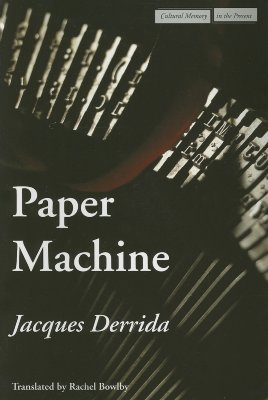What do you think?
Rate this book


222 pages, Paperback
First published October 8, 2001
’Paper echoes and resounds, subjectile of an inscription from which phonetic aspects are never absent, whatever the system of writing. Beneath the appearance of a surface, it holds in reserve a volume, folds, a labyrinth whose walls return the echoes of the voice or song that it carries itself; for paper alsop has the range or the ranges of a voice bearer. Paper is utilized in an experience involving the body, beginning with the hands, eyes, voice, ears; so it mobilizes both time and space. Despite or through the richness and multiplicity of these resources, this multimedia has always proclaimed its inadequacy and its finitude.It is interesting to see how paper has such a vast assortment of connotations. There are many positives, and Derrida points out that the word book, as in the Latin word liber which was a word for the bark that was used to make the paper that became a book, really designates the paper it is printed on. Paper also comes with a sense of being disposable, and has a multitude of negative connotations. A few that Derrida explores are that a broke promise or a broke signed allegiance becomes merely ‘bits of paper’, and armies numbers or monetary wealth are able to be discredited or at least reduced by referring to it as being ‘only on paper’, thus signifying an abstraction not related to a true fixture in reality. Paper has thousands of uses as well, for words, images, and even rolling papers, toilet paper and currency (his examples). Derrida argues that we will not be able to remove ourselves from our reliance on paper. He even says that it was made to be reduced, as every stroke of the pen is covering up it’s surface, thus reducing the paper while making it into something greater.